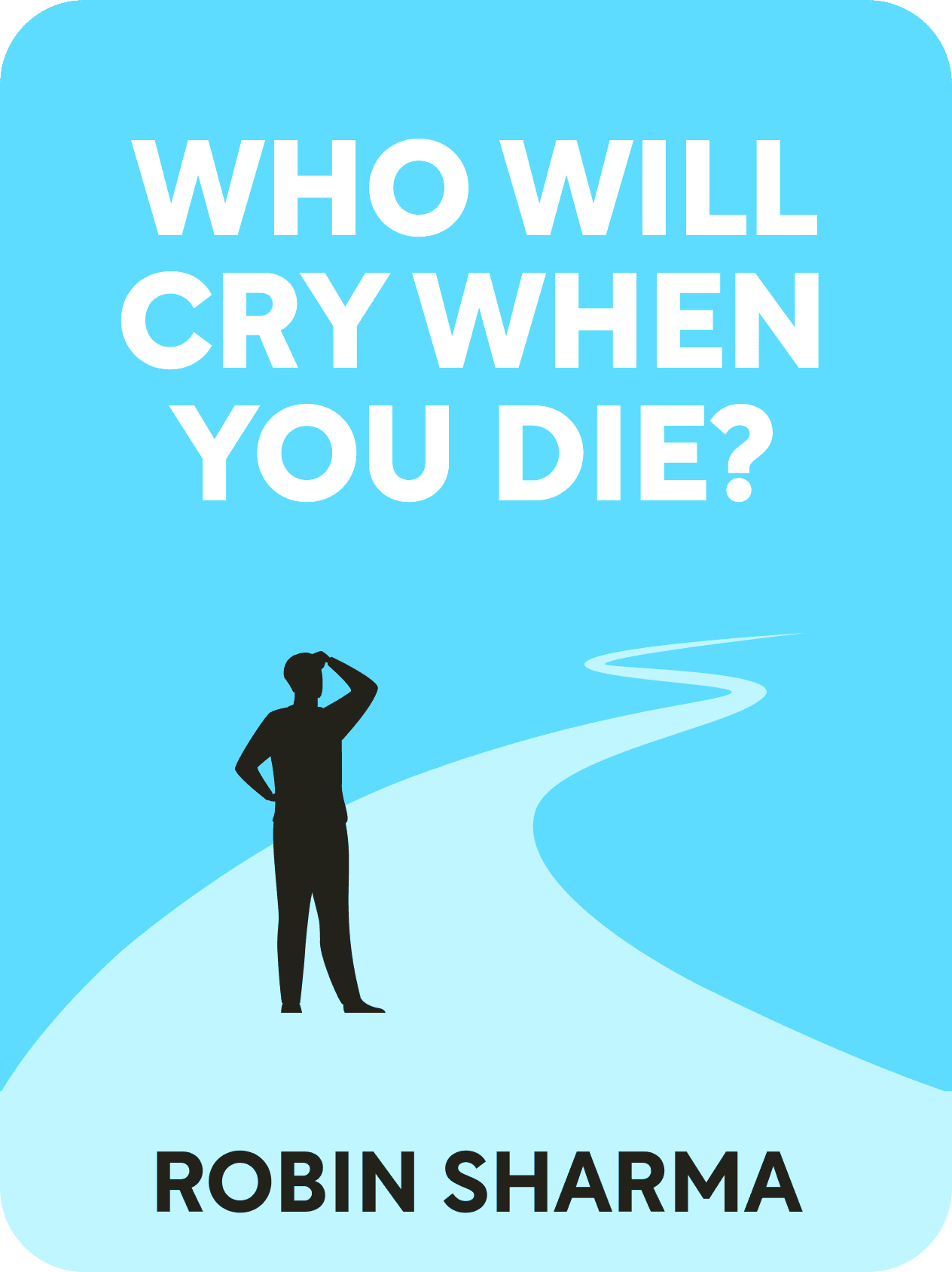Robin Sharma’s Who Will Cry When You Die? is an insightful self-help book designed to inspire people to live meaningful and purposeful lives. It is part of The Monk Who Sold His Ferrari series and continues to share the author’s timeless wisdom for personal and professional growth. The book is structured as a collection of 101 life lessons, each one a short yet profound reflection on how to lead a better life. With simple language and actionable advice, it speaks directly to readers of all ages and backgrounds.

What Is the Book About? : Who Will Cry When You Die?
The title poses a thought-provoking question that serves as the foundation of the book: Who will cry when you die? Sharma challenges readers to think about their legacy and the impact they want to leave behind. He emphasizes the importance of living a life that not only fulfills personal goals but also contributes positively to others.
The book is structured into 101 short chapters, with each chapter offering a unique perspective or actionable step toward a meaningful life. Sharma focuses on cultivating good habits, building character, and finding joy in small things.
Why This Book Matters : Who Will Cry When You Die?
In today’s fast-paced world, people often feel disconnected, overworked, and unfulfilled. Who Will Cry When You Die? offers a solution by encouraging mindfulness, self-discipline, and compassion. Unlike complex self-help guides, Sharma’s advice is practical and easy to implement, making it accessible to everyone.
The book is particularly valuable because it addresses timeless topics such as gratitude, purpose, kindness, and personal growth. These are issues that resonate with anyone looking to improve their life.
Key Lessons from the Book
Here are some of the most powerful lessons from Who Will Cry When You Die?:
- Discover Your Life’s Purpose
In the first chapter, Sharma talks about the importance of finding your calling. He believes that every individual has a unique purpose in life. Identifying and pursuing this purpose leads to fulfillment. Instead of living life passively, we should actively shape it by aligning our actions with our passions and values. - Be Kind to Others
Sharma emphasizes kindness as one of the simplest yet most impactful virtues. Small acts of kindness, like smiling at strangers or helping those in need, can create a ripple effect of positivity. He reminds readers that compassion and understanding are essential for building strong connections. - Start Your Day Well
The author introduces the concept of the “Platinum 30,” the first 30 minutes of the day, which he considers the most valuable. He suggests using this time to meditate, reflect, or plan your day. Starting the day with intention sets the tone for a productive and positive day ahead. - Keep a Journal
Writing in a journal is a recurring theme in the book. According to Sharma, journaling helps in self-reflection and organizing thoughts. It serves as a tool for tracking progress, understanding emotions, and setting goals. - See Obstacles as Opportunities
One of the standout lessons in the book is to view challenges as opportunities for growth. Sharma argues that difficult times teach resilience and strength. Instead of avoiding problems, we should embrace them as learning experiences. - Practice Silence and Solitude
In a world filled with distractions, Sharma advises practicing silence and spending time alone. This helps in reconnecting with oneself and gaining clarity. Silence allows us to reflect on our actions and priorities without external noise. - Take Risks
The book encourages readers to step out of their comfort zones and take risks. Sharma believes that the greatest rewards often come from embracing uncertainty. He urges readers to see fear as an opportunity for growth. - Learn to Say No
Many people struggle with overcommitment, which leads to stress and burnout. Sharma suggests learning to say “no” gracefully to focus on what truly matters. Saying no to distractions allows us to concentrate on our personal goals and well-being. - Laugh More
Laughter is an essential part of a happy life. Sharma encourages readers to find joy in simple things and not take life too seriously. He believes laughter boosts creativity, reduces stress, and improves overall well-being. - Leave a Legacy
Ultimately, the book asks readers to reflect on their legacy. How will people remember you when you’re gone? By living a purposeful and compassionate life, we can leave behind a positive impact on others.
Writing Style and Structure
Robin Sharma’s writing is simple, direct, and highly engaging. Each chapter is short, usually no more than a few pages, making it easy for readers to digest the content. The conversational tone makes the lessons relatable and actionable. The structure of the book allows readers to pick it up at any point and still benefit from its wisdom.
The book is filled with quotes, anecdotes, and personal experiences that add depth to the lessons. Sharma also includes practical tips, making the advice immediately applicable.
Who Should Read This Book?
Who Will Cry When You Die? is suitable for anyone looking to improve their life. Whether you’re a student, professional, parent, or retiree, the book has something valuable to offer.
It is especially helpful for people who feel stuck in their routines or overwhelmed by modern life. The simple and practical advice is designed to motivate readers to take small steps toward big changes.
Why You Should Read This Book
- Practical Advice: The lessons are easy to understand and apply in daily life.
- Short Chapters: Each chapter can be read in a few minutes, making it perfect for busy readers.
- Timeless Themes: The book focuses on universal values like kindness, purpose, and gratitude, which are relevant to everyone.
- Motivational Tone: Sharma’s positive and encouraging tone inspires action.
- Wide Appeal: The book is written for a broad audience, from self-help beginners to seasoned readers.
Final Thoughts
Robin Sharma’s Who Will Cry When You Die? is a treasure trove of wisdom that inspires readers to live with intention and purpose. Its practical lessons and simple writing style make it a must-read for anyone looking to improve their life.
By focusing on small, daily actions, the book empowers readers to make meaningful changes and leave a positive impact on the world. If you’re looking for a guide to living a more fulfilling life, this book is a great place to start.




Your point of view caught my eye and was very interesting. Thanks. I have a question for you.
Thank you for your sharing. I am worried that I lack creative ideas. It is your article that makes me full of hope. Thank you. But, I have a question, can you help me?
Your point of view caught my eye and was very interesting. Thanks. I have a question for you.
Your point of view caught my eye and was very interesting. Thanks. I have a question for you.
Thank you for your sharing. I am worried that I lack creative ideas. It is your article that makes me full of hope. Thank you. But, I have a question, can you help me?
Thank you for your sharing. I am worried that I lack creative ideas. It is your article that makes me full of hope. Thank you. But, I have a question, can you help me?
Heya! I just wanted to ask if you ever have any problems with hackers? My last blog (wordpress) was hacked and I ended up losing many months of hard work due to no data backup. Do you have any solutions to stop hackers?